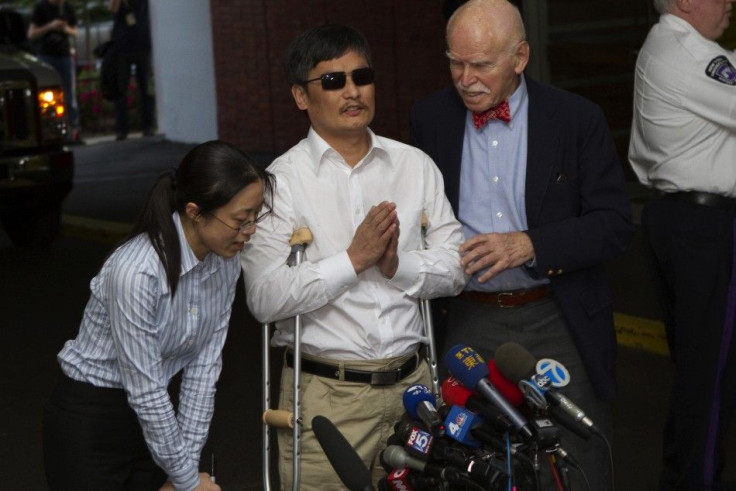Blind Activist Chen Guangchen Says China Threatens U.S. Academic Freedom

Last week the New York Post broke the news that Chen Guangchen, the blind Chinese activist who escaped house arrest and was brought to New York, is leaving the institution that helped him seek asylum in the U.S., New York University. In the most recent back and forth of statements, NYU law professor Jerome Cohen, one of the people instrumental in Chen’s transfer from Beijing to the U.S., said claims that the institution is kowtowing to China’s government are “all nonsense.”
In separate statements, Chen and NYU seem to disagree about the reasons the Chinese lawyer is leaving the institution. Chen stated that NYU was urging him to leave “as early as late August and September [of last year],” after receiving pressure from the same government that had held him under house arrest prior to coming to New York. “The Chinese Communists have already begun to apply great, unrelenting pressure on New York University,” he wrote.
Cohen spoke to Foreign Policy magazine on Monday, disputing Chen's claims, which confirmed what the Post had reported. During the phone interview, Cohen says he would not have pushed for NYU to be Chen’s host if concerns of government pressure were legitimate. “I hate malicious gossip. People just say things, they talk. It’s very unfortunate. If I had seen a basis for [NYU restricting Chen] at all, I would have been the first to raise an alarm.”
However, Chen insists that China’s reach in the United States is being underestimated. “The work of the Chinese Communists within academic circles in the United States is far greater than what people imagine,” the activist said in a statement released by his lawyers. “Academic independence and academic freedom in the United States are being greatly threatened by a totalitarian regime,” Chen warned.
Bob Fu, the president and founder of ChinaAid, told Lifesite News that even if a university is not under direct pressure from Beijing, many will still practice self-censorship to avoid jeopardizing future enrollment or support in the world’s biggest developing economy. “American universities are out chasing the China dollar and are very reluctant to work with dissidents who have a strong voice in China,” Fu said. “Particularly if a college president believes their China campus or the future enrollment of Chinese students will be sabotaged,” Fu said.
Regardless of the reasons he is leaving, Chen is still grateful to NYU for its help and support thus far, which includes housing his wife and two children in a faculty apartment in New York City.
As for his next step, Chen has been in negotiations with other institutions in the area, including Fordham University and Princeton University. Fordham’s senior director of communications, Bob Howe, confirmed that the school’s Leitner Center for International Law and Justice was in negotiations with the activist. Chen’s other option is rumored to be with Princeton’s Witherspoon Institute, a widely known conservative think tank that was founded on religious values and is openly opposed to, among other issues, abortion.
The issue of abortion is of particular interest to Chen because much of his activism in China revolved around protests against forced abortions resulting from the country’s one-child policy. According to the Financial Times, Chen is opposed to forced abortions but also believes in a woman’s right to choose, which might not be in line with Witherspoon's tenets. The Leitner Center, while part of Fordham University, which is a Catholic institution, does not take an official position on abortion.
© Copyright IBTimes 2024. All rights reserved.












